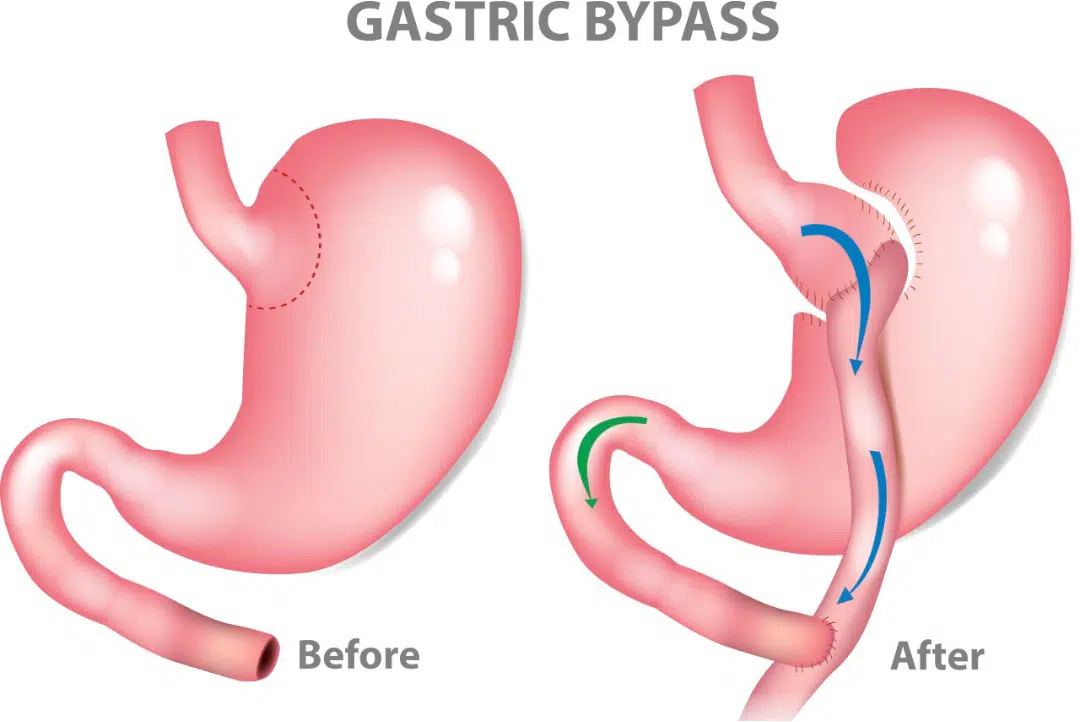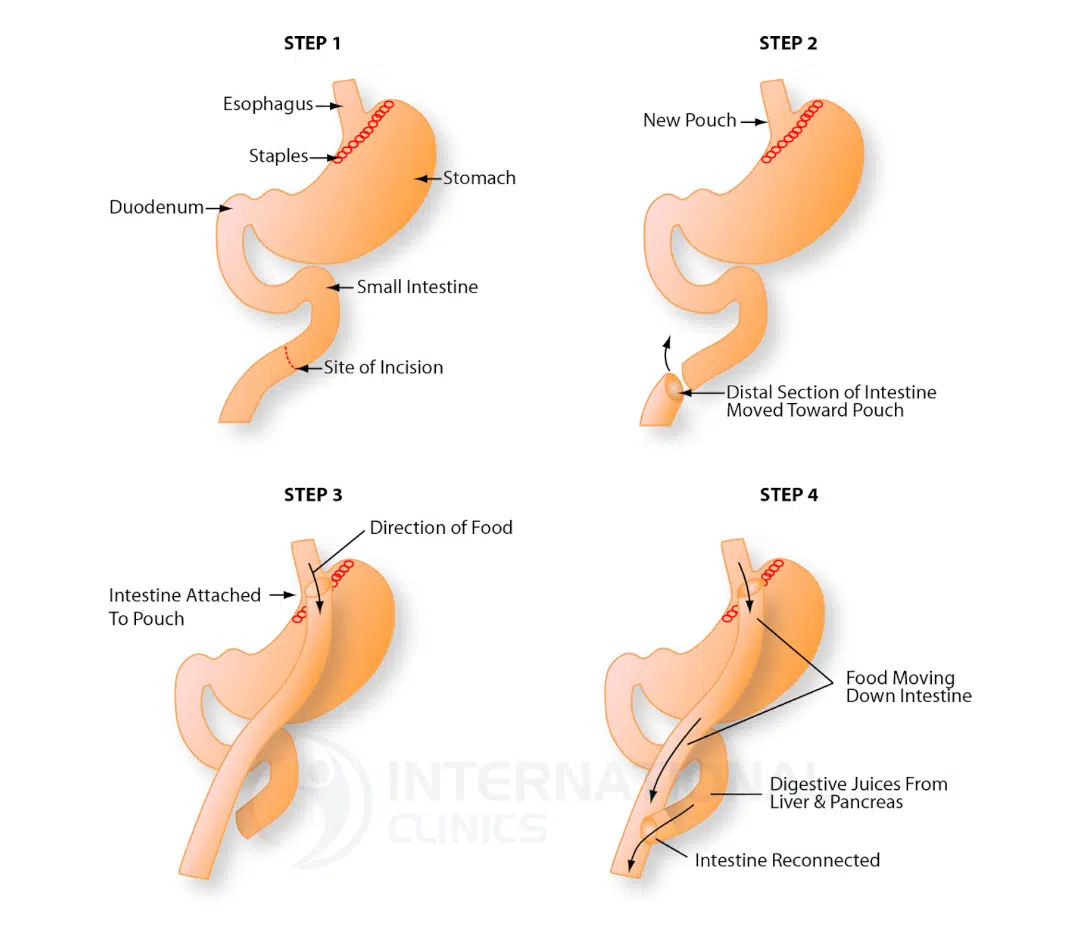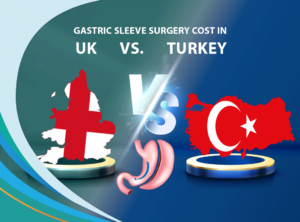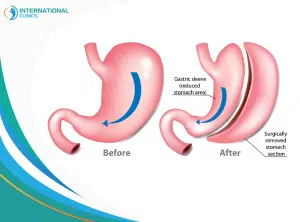Obesity is a major problem for millions of adults worldwide, and it increases on all fronts and among all age groups.
The alarming rise in obesity rates has led to an increasing demand for bariatric surgery procedures like gastric bypass, which remains the gold standard treatment for clinically severe obesity.
Gastric bypass is a complex procedure that involves creating a small pouch from the stomach and connecting it directly to the small intestine, bypassing a large portion of the stomach and duodenum.
This anatomical rearrangement restricts food intake, decreases absorption of nutrients, and alters gut hormones to suppress appetite and induce early satiety.
Numerous studies have found gastric bypass to be highly effective for substantial and sustained weight loss in morbidly obese patients. On average, patients lose about 60-80% of their excess body weight within 12-18 months after surgery.
Besides impressive weight loss, the procedure also leads to drastic improvement or remission of obesity-related comorbidities like type 2 diabetes, high blood pressure, sleep apnea, and other problems.

Given the profound benefits, it’s no surprise that gastric bypass is preferred over other bariatric surgeries worldwide. However, undergoing this complex procedure comes at a heavy price.
Next, we’ll try to provide an in-depth comparison of gastric bypass costs globally and an analysis of the many factors influencing surgery expenses.
Gastric Bypass Surgery Cost
The cost of gastric bypass surgery can range wildly between countries and even between different regions within the same country.
From as low as 4000 US dollars to as high as $30000 US dollars, the cost is certainly not unified or symmetrical.
In any case, several key factors influence the huge variation in surgery expenses globally:
Hospital & Surgeon Fees
The reputation, experience, and fees charged by the surgeon and hospital greatly impact the costs of bariatric procedures.
It makes sense that highly skilled surgeons and well-equipped hospitals with reliable infrastructure charge premium rates to cover expenses.
Extent of Obesity
More complex and risky revisional surgeries required for severely obese patients with a BMI over 50 can increase costs by 50% or more due to higher risks and longer procedure times.
Private vs Public Facility
Getting the surgery at a private hospital instead of a government-subsidized public healthcare facility can double the charges due to the nature of the business.
Use of Technology
Utilizing expensive robotics and laparoscopic equipment rather than basic tools increases hospital bills due to high purchase and maintenance costs.
Hospital Stay Duration
Each additional day of hospitalization due to complications or delayed recovery can rapidly escalate costs due to room rentals, nursing care, medications, etc. Quick discharges save money.
Insurance Coverage
Good insurance benefits or public funding to cover bariatric surgery costs results in lower expenditures for citizens than self-funded procedures.
Destination Country
Affordable offshore destinations like Turkey reduce costs by 60-70% compared to surgery in costly developed countries like the US.
Medical Tourism
Traveling abroad for surgery in accredited facilities offering high-quality affordable bariatric surgery in countries like Turkey cuts costs tremendously.

Gastric Bypass Surgery Cost in the USA
The United States is one of the best destinations for medical procedures, but it’s also one of the most expensive locations in the world for bariatric surgeries like gastric bypass.
On average, patients pay a staggering 20,000 to 30,000 US dollars for this procedure in the U.S.
The prime reason for the sky-high price tag originates from heavy reliance on the private healthcare system.
Most bariatric surgeries are performed at private hospitals that incur high overhead costs which translate into inflated surgery charges.
Even more importantly, top bariatric surgeons in the U.S. can charge premium professional fees given their reputation and long waitlists.
These highly qualified surgeons with decades of experience and proven track records can command upwards of 20000 US dollars in fees for a complex gastric bypass procedure.
On top of the already high surgeon and hospital fees, the U.S. healthcare system also tends to utilize robotic surgery tools and advanced laparoscopic equipment, which raise procedural costs due to their high purchase and maintenance expenses.
These innovative surgical technologies provide refined precision and techniques for better outcomes but cost a fortune.
Another contributor is that the average American patient seeking bariatric surgery tends to be extremely morbidly obese, with BMIs usually well over 40-50.
These people frequently have multiple obesity-linked comorbidities like diabetes, hypertension, sleep apnea, etc.
This means they often require highly complex surgeries, conversions from failed gastric bands or sleeves, and other challenging procedures that require more extensive surgical time and resources.
These higher-risk patients may also face complications necessitating prolonged hospital stays which exponentially increase the final bill with added room charges and care costs.
Finally, the lack of universal public healthcare and limited insurance coverage for weight loss surgery means the bulk of these inflated costs are out-of-pocket expenditures for patients.
Private insurers may subsidize 50-75% of costs based on the plan. Without transparent, fixed pricing regulations, hospitals are free to charge exorbitant undisclosed fees for surgical facilities, equipment, operating rooms, supplies, medications, recovery care, etc.
This hits uninsured and underinsured patients the hardest with unaffordable bills.
However, the sheer scale of the obesity crisis and the desperation to lose weight drive thousands to still undergo gastric bypass every year, making it one of the most common bariatric procedures worldwide.
Gastric Bypass Surgery Cost in the UK
If deemed medically necessary, The United Kingdom provides gastric bypass surgery completely free of cost to patients through their National Health Service (NHS), which is publicly funded through taxes.
However, lengthy waiting times of 2-5 years on NHS lists have compelled many desperate patients to pay for private surgery instead.
Typical costs for private gastric bypass procedures in the UK range between 8000 to 15,000 US dollars on average.
While still expensive, this is nearly half the price compared to the 20,000 to 30,000 US dollars fee in the United States.
There are several reasons for the lower costs of private bariatric surgery in the UK. For one, private hospitals face more intense competition and cannot inflate prices too high given the availability of low-cost NHS surgery.
This pushes private facilities to offer relatively affordable packages to attract patients tired of waiting. Surgeons’ fees are also lower compared to those in the US.
Most patients experience smooth recoveries and shorter 2–3-day hospital stays after gastric bypass with minimal complications.
This keeps accommodation and in-hospital care costs in check. A lower incidence of health problems like diabetes in the UK also contributes to faster recovery.
For patients choosing private care, medical insurance plans provide partial coverage of surgery costs and hospitalization fees. This subsidizes the overall expenditure to some extent.
However, the generally high cost of living, medical care, and private healthcare in the UK keep medical costs elevated compared to developing countries.
The reputable healthcare system and abundance of expert NHS-trained bariatric surgeons make it an attractive option at a lower price point than in the USA.
Gastric Bypass Surgery Cost in Australia
The typical cost for a private gastric bypass procedure in Australia ranges from 6,000 to 15,000 US dollars on average.
This is noticeably lower than the cost in the United States and is comparable to the UK.
Several factors contribute to Australia’s ability to offer gastric bypass at relatively affordable rates compared to other developed countries.
Firstly, the country has a publicly funded universal healthcare system that provides partial subsidies for citizens opting for essential surgeries performed privately.
This reduces the patient’s expenditure to some degree. Australia also benefits from short standard hospital stays of just 2-3 days for uncomplicated bariatric surgeries like gastric bypass.
Minimal complications and faster discharges from hospitals prevent accommodation and in-patient care costs from escalating.
This is aided by no additional costs for cutting-edge technology or extensive aftercare programs.
It’s important to notice here that the Australian government has clear guidelines enforcing standardized fees that surgeons and hospitals can charge for bariatric surgery.
This prevents price gouging and inflated costs, introducing a higher degree of transparency and uniformity in pricing.
The high prevalence of obesity in Australia also creates significant demand for weight loss surgeries like gastric bypass.
To attract patients, hospitals, and surgeons price their services competitively while still maintaining good profit margins.
However, out-of-pocket costs are still substantial for most average patients considering the procedure in Australia.
Moreover, waiting times of 2-3 years for publicly funded surgeries under Medicare also push many toward expensive private options.
Gastric Bypass Surgery Cost in Turkey
Turkey is a clear win in the competition inside the circles of medical tourism, thanks to its affordable, safe bariatric surgeries like gastric bypass.
The typical cost of gastric bypass procedures in Turkey ranges from an average of 4000 to 9000 US dollars, almost 4-7 times lower than prices in the USA and UK.
There are several key reasons for Turkey’s ability to offer such low-cost bariatric surgery packages.
Firstly, Turkey has a significantly lower cost of living and healthcare costs compared to Western countries.
Surgeon fees, hospital charges, and medication rates are very reasonable compared to the exorbitant rates in America and Europe.
In addition, patients usually only require a short 2–3-day hospitalization for smooth, uncomplicated surgeries.
This minimizes the accommodation and in-patient care costs that can quickly accumulate with prolonged hospital stays often seen in other countries.
Turkish hospitals also utilize the latest technology like advanced laparoscopic surgical tools which support faster recovery and earlier discharge.
Furthermore, Turkey’s top bariatric centers, such as International Clinics, have expert obesity surgeons who perform thousands of bypass surgeries annually.
This high volume of procedures ensures immense surgeon experience. However, it also means patients generally have minimal waits to undergo surgery at a time of their choice.
No waiting lists and immediate availability of surgeons also help lower costs. The country boasts many JCI-accredited facilities and clinics with all the latest technology, equipment, and amenities able to rival top global hospitals.
Each hospital specializes in bariatric surgery and offers luxurious care. But costs are still very reasonable compared to other destinations.
Surgeons trained and certified internationally provide their expertise and skilled services at highly competitive rates as well, while maintaining excellent track records and results.
Many even offer fixed, packaged pricing for the entire surgical journey to ensure complete transparency.
Finally, Turkey’s booming medical tourism sector focuses on catering to foreign patients by offering expert quality care, cutting-edge technology, luxury experiences, and exceptional value.
The combination of top-notch affordable surgery and a vacation further adds to Turkey’s popularity for medical tourists from around the world seeking gastric bypass.
Of course, travel costs need to be added for foreigners coming to Turkey for surgery. Still, the total cost remains significantly lower than in their home countries.
Read more about: Gastric Bypass Surgery in Turkey

Global Comparison of Gastric Bypass Surgery Cost
Several healthcare, economic, and socio-cultural factors influence gastric bypass costs across different countries:
- Public vs private healthcare: Countries like the UK and Australia with free universal healthcare funded by the government can offer gastric bypass either for free or at heavily subsidized rates through their public health systems. Contrarily, the predominance of expensive private healthcare in the USA leaves patients with crippling out-of-pocket costs.
- National insurance coverage: Comprehensive public or private medical insurance that covers bariatric surgeries ensures lower personal expenditure. But, in countries like Mexico with poor insurance coverage, patients must bear the full costs out-of-pocket.
- Standardized pricing: Uniform standardized rates set by healthcare authorities for surgeons’ fees, hospital charges, room rentals, etc. help lower cost variability and inflated pricing seen in the USA.
- Medical tourism: The availability of accredited facilities offering affordable gastric bypass in medical hubs like Turkey and Mexico proves cost-saving for thousands of foreign patients annually.
- Surgeon’s experience: Renowned bariatric surgeons with decades of experience and proven track records justify the premium fees they charge for their expertise gained from thousands of successful procedures.
- Hospital facility: Private hospitals with the latest technology, equipment, and amenities have much higher overhead costs that translate into inflated surgery charges compared to small clinics.
- Insurance coverage: Good insurance benefits like those covering bariatric surgery costs in full or part can reduce out-of-pocket expenditure drastically compared to self-funded procedures at inflated charges.

FAQs About Gastric Bypass Surgery Cost
Why Does Gastric Bypass Surgery Cost Vary So Much Globally?
The huge variation in costs for gastric bypass surgery worldwide is due to differences in each country’s healthcare systems, insurance coverage, surgeons’ fees, hospital charges, standards of care, and cost of living.
How Can I Get Gastric Bypass Surgery for Free or at Low Cost?
You may be able to get free or subsidized gastric bypass surgery by going through the public healthcare system in countries like the UK, Australia, and Canada which offer the surgery for free or at low cost.
Is Gastric Bypass Surgery Cheaper Than Gastric Sleeve?
Gastric sleeve surgery is generally cheaper than gastric bypass. The lower cost for sleeve surgery is due to it being a simpler, less invasive procedure with lower risks of complications and faster recovery.
Does Gastric Bypass Surgery Lead to Significant Weight Loss?
Yes, gastric bypass surgery delivers substantial and durable weight loss in severely obese patients, leading to over 60% excess weight loss on average. It is significantly more effective than lifestyle changes or medication alone for obesity reduction in eligible surgical candidates.
Conclusion
Although obesity rates continue to climb worldwide, the decision to solve this problem by weight loss surgery can be taken by a lot of patients, but the cost is still a barrier.
The high costs restrict access for patients globally, especially in developing countries. Governments try to fund obesity treatment and provide affordable bariatric surgery options to their citizens, but it’s easier said than done.
The cost of gastric bypass surgery is high in the US and UK, but it’s quite affordable in Turkey and many other countries in the global south.
Greater surgeon mobility and medical tourism can improve the availability of low-cost bariatric surgery in more countries.
Telemedicine and remote care models can help optimize post-operative care while reducing associated costs.
Robotics and other emerging technologies are also expected to enhance outcomes while minimizing hospital stays and expenses.





